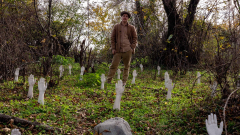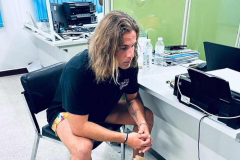“If our people are dying because of the Russian state, shouldn’t the Russian people also be ready to stand up (and resist) even if there is a danger to their lives? They are all to blame for what’s happening now.”
— Valeriya Boyko, 25, displaced Ukrainian from the eastern Donetsk region
KVEDA PONA, Georgia – It’s a magical, rustic kingdom where an enchanted fairy-tale forest opens up to reveal waterfalls and mountain lakes; where a bubbling brook flows softly underneath dappled light as farm animals graze freely around your feet; where the vibe is creative-whimsical-cum-merry; where eco-warriors, artists and coders can learn new skills and debate the merits of democracy and solitude while baking artisanal bread.
And where even rank-and-file Russian passport holders can temporarily feel free from the pressure of the government fighting in their name in Ukraine – as well as from all those who say they are not doing enough to stop it.
At least, that’s the sales pitch for Chateau Chapiteau.
“When people come here they feel it’s a place that is out of context, a bubble, it exists on its own, you can get lost,” said Vanya Mitin, the 38-year-old Moscow-born entrepreneur who founded the commune 90 miles northeast of Tbilisi, the capital of Georgia, a small but tough former Soviet republic located at the crossroads of Eastern Europe and Western Asia.
Chateau Chapiteau opened three years ago. It caters to seekers, wanderers and political, social and cultural exiles of various stripes. Now, nearly a year since Russia’s invasion of Ukraine, this forest close to where Georgia meets the Russian republics of Chechnya and Dagestan has become another kind of haven, one for Russians who have fled their own country because they don’t agree with the war in Ukraine and don’t want to fight in it.
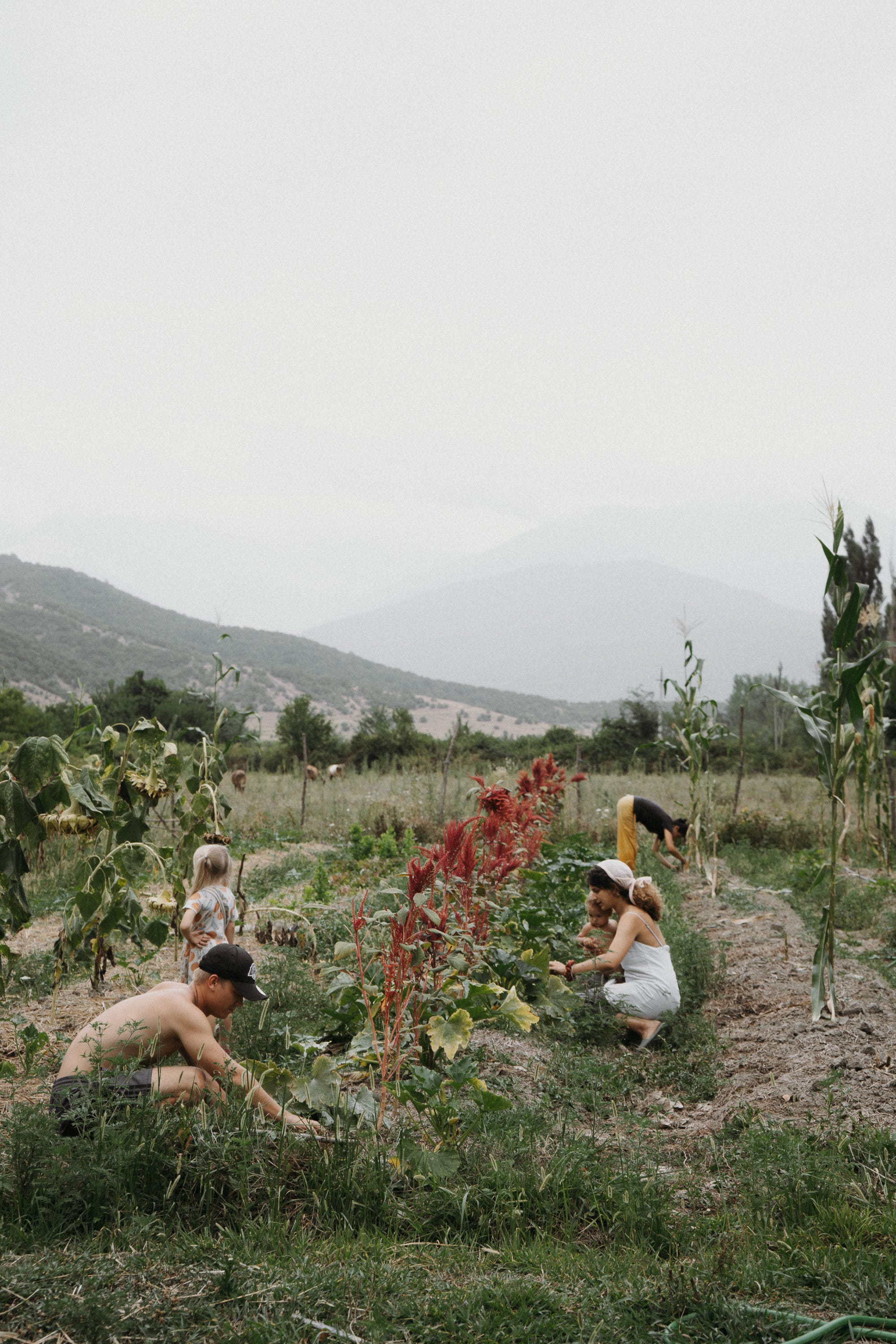
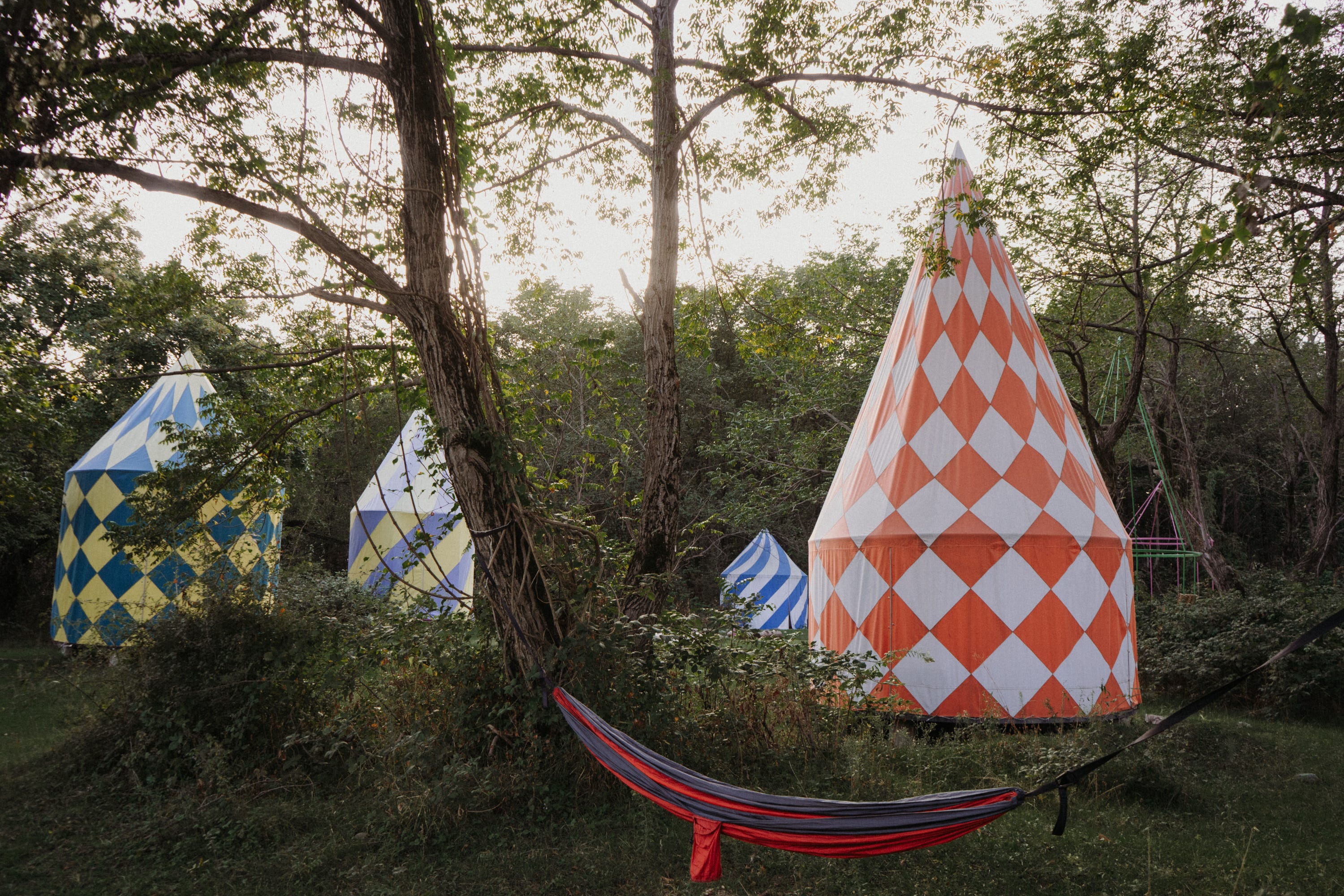
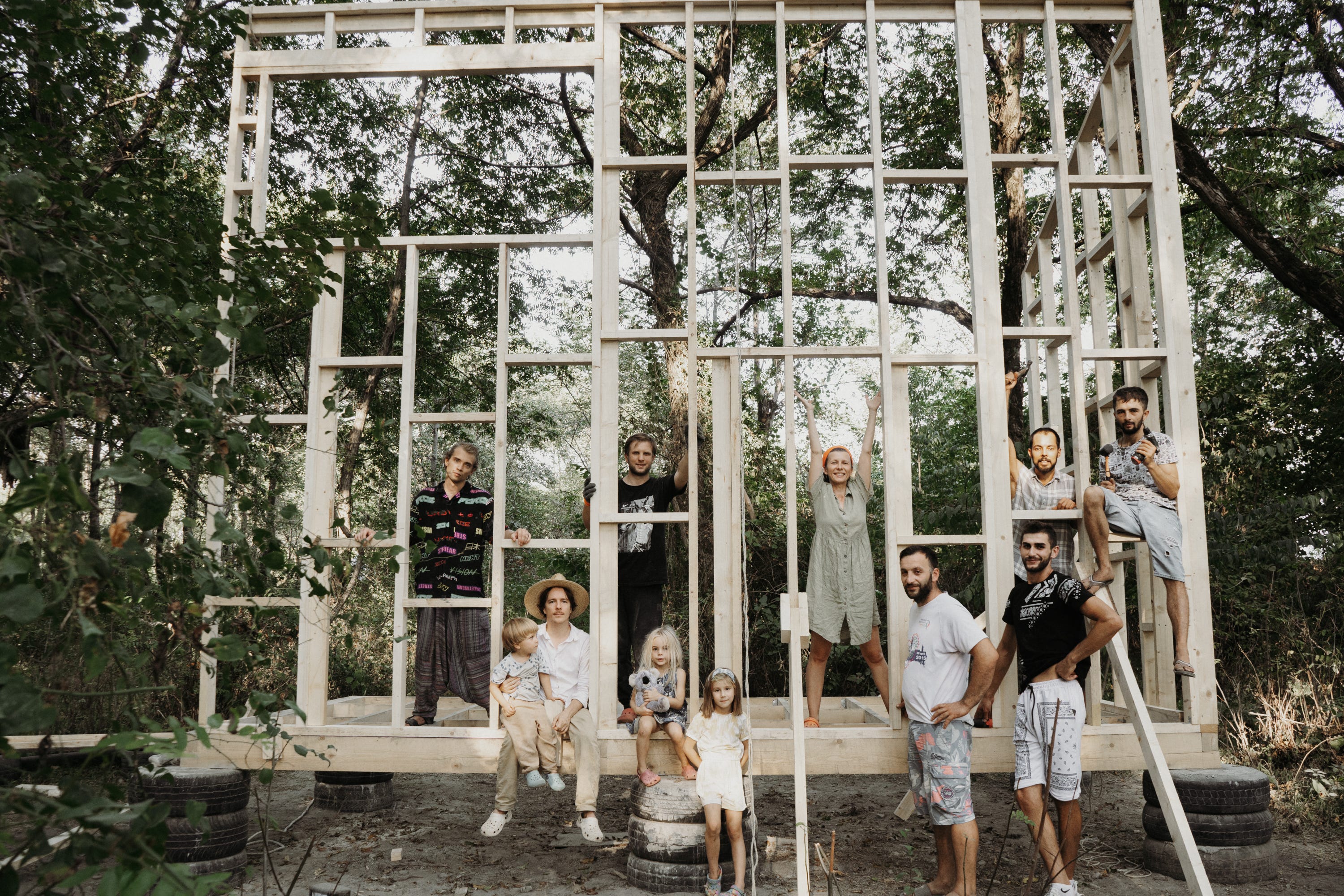
At work on the grounds and in the fields of Chateau Chapiteau.
At work on the grounds and in the fields of Chateau Chapiteau.
Courtesy of Chateau Chapiteau
“It is not that we are ignoring the war,” insisted Mitin, whose serious demeanor belies a dryness and archness of humor in his approach to business that is often wacky. One of his previous ventures in Russia that also had a branch in England was a series of cafes that charged customers only for the amount of time they spent on the premises. Even when Mitin is smiling, there is a little bit of a shrug to it that colors his apparent happiness.
“Most of the people with Russian backgrounds here, they were activists, or still are. They went to protests. There is nobody here, for example, who supported Putin even before the war,” he said.
Since the earliest days of the invasion directed by Russian President Vladimir Putin, Ukrainians made little secret of the moral weight they placed on the Russian people. If Putin’s war was wrong, then his people had an obligation to rebel, rise up, agitate, protest, despite the Russian promise of crackdown on dissent. And in Russian protests, some did.
But far more have cast their lots another way, by leaving Russia entirely, especially once the threat of civilian mobilization meant ordinary Russians were likely to be drafted into the war if they remained at home.
So they have left by the thousands, especially for neighboring countries where Russians still enjoy visa-free access.
Putin’s sway over the hearts and minds of Russians remains a pivotal question for the future of the war. Even Ukrainian President Volodymyr Zelenskyy alluded to it, during an appearance before the U.S. Congress on Wednesday. “The Russians will stand a chance to be free,” Zelenskyy said, “only when they defeat the Kremlin in their minds.”
Across Georgia today, untold thousands of Russians grapple in their own ways with the questions posed by the war. How much responsibility do they share for the decisions of Putin, for the suffering of Ukrainians? And what, if anything, should they do about it?
Expatriate Russians ask themselves these questions – or avoid asking them – in housewarming parties in Tbilisi, in cafes and bars, art shops and bookstore basements. And even in amid the pools and vines of a forest at the foot of the Caucasus Mountains.
The retreat at Kveda Pona sprawls over about 30 acres.
It sits on farmlands in a scenic plain that faces the barrier range of snow-capped peaks and picturesque villages. This mountain range runs from the Black Sea in the west to the Caspian Sea in the east, putting up a geologic fence line that makes uneasy neighbors of Georgia to the south and the Russian Federation to the north. The border stretches for about 550 miles.
There’s an orchard, a farm, a large studio building, smaller workshops, wooden cabins, a communal kitchen and entertainment room with a cozy fireplace, a bar in the woods, a collapsible ping-pong table and a makeshift swing over a stream made out of an old iron bed-frame. Some other parts of Chateau Chapiteau, such as traditional Georgian houses, are still under construction.
Some Russians escape country, war in Ukraine, to a ‘fairytale’ retreat in nearby Georgia
A “fairytale” like retreat in the country of Georgia has become a space where some Russians go to escape conscription in the war in Ukraine.
PEARLY JACOB FOR USA TODAY
Wandering the grounds one day as autumn gathered last month, in no particular order, was a confusing mixture of employees, volunteers, paying guests, friends, hangers-on, ex-wives, ex-husbands, two small children rolling around in the mud, one teenage Georgian kitchen worker from the nearby village, two recently arrived Germans, a Russian-speaking American from Colorado who said she had just got here from Turkey where she saw scores of exiled Russians “behaving like they were on a beach vacation,” several boisterous dogs, three cats and at least two chickens, one of whom is called “City.” It was exceptionally hard to get a sense of how many people really lived there. At least 20. Perhaps as many as 50.
Around midday, there was a brief commotion as an all-hands buffet-style lunch of buckwheat (vegetarian and vegan options), chopped beet root, soup, bread and various salads was served in a main building on the estate. Halfway through the meal, Mitin abruptly stood up and walked over to an electric piano and started accompanying one of the instrument’s preprogrammed songs. It sounded like an upbeat video game tune. When he tired of that, he briefly left the room and came back with a guitar, which he started quietly fingerpicking and eventually graduated to some light strumming. He said nothing.
Daniil Mulyard, Mitin’s half-brother, leaned in semi-conspiratorially from across the table.
“You know,” he said, “even when the war first started, the protests in Russia were not very big. A couple of thousand people in Moscow, St. Petersburg and other big cities. People were afraid. And actually I think that most of the people who went to those protests have now left Russia.”
Mulyard, 28, is in a pretty good position to know.
At Chateau Chapiteau, he cares for the organic cucumbers and other produce grown on site. But he also works for OVD-Info, a Moscow-based independent human rights group that focuses on political persecution in Russia. OVD-Info tracks arrests of protesters, monitors censorship and helps with legal aid. According to OVD-Info data, about 20,000 protesters have been detained in Russia for various periods of time since Feb. 24, the start of the war.
“In my experience, it’s usually the same circles of people” who go to the protests, Mulyard said. “It’s seldom people from different circles. There’s really nobody left to protest.”
More: Plotting the locations of ‘one of the biggest rocket attacks’ Russia has unleashed on Ukraine
“They escape to Georgia and the European Union and pretend to be Ukrainians there. … We expect Russians to persuade their own men – their fathers and sons in the military – to leave the territory of Ukraine.”
— Anastasiya Orlova, 28, a Ukrainian who works for a Kyiv-based humanitarian organization
A ‘new language’: What is a Russian’s responsibility?
Every Sunday, a 23-year-old Muscovite with tousled hair, a broad, flat forehead and advanced skills in logical deduction named Arseny Velikanov sits at the head of a plastic garden dining table, in the basement of a bookstore, in a country Russia has fought several wars with, and tries to conjure what he calls a “new language.”
This language is full of contradictions, history, abstract concepts, moral quandaries, emotional pitfalls, anger, tension. It is riddled with guilt, shame, fear, confusion. Its would-be speakers – including himself – are a little spoiled, Velikanov believes. Cowards, others say.
“I was about a year old when Putin became Russia’s president,” Velikanov said one evening in mid-November in Tbilisi, a chaotic, ancient city that is increasingly filled with Russians wearing denim, patterned shirts, vintage dresses, structured coats and beanie hats.
Russians fleeing Putin’s war add new strain to old tensions in nearby Georgia
Russians fleeing conscription for the war in Ukraine to Georgia are furthering tensions between the two countries that have existed for generations.
PEARLY JACOB FOR USA TODAY
Tbilsi is a former Silk Road capital, a bohemian place where speakeasy culture unfussily sits alongside vintage flea markets and towering Orthodox churches. It is also a haven for food and wine lovers. Archaeologists have pinpointed the world’s earliest known vintners, circa 6,000 B.C., to Georgia. Wine is the nation’s second-largest export after ferroalloys.
There are no precise totals for how many Russians have left the country since February. But estimates based on media reports and figures released from neighboring countries where Russians enjoy visa-free access, such as Georgia and Kazakhstan, indicate it runs into the hundreds of thousands, perhaps even as high as 700,000.
This exodus is the smaller one in the wider region: The United Nations estimates 7.8 million Ukrainian refugees have been forced to flee their homes and seek safety, protection and humanitarian assistance as Russia’s military has destroyed Ukrainian infrastructure and appeared to deliberately target civilians. Humanitarian organizations have warned a new wave of Ukrainian refugees may be coming this winter as Russian missile attacks deprive millions of access to electricity, heat and water.
Velikanov had just finished one of his weekly talks at the bookstore for about a dozen people, all of them Russian. Upstairs, the bookshelves were filled with Russian-language graphic novels, thrillers and reference titles. In one corner of the store, a few kids played board games as their Russian parents exchanged news, gossip and worry with friends about home. A small bar serving coffee, beer and sandwiches was tended by a tattooed Russian who volunteered that back in Moscow, before the war, he used to work in a sex shop.
“I am always asking myself: Have I done enough? How much am I to blame? This is what we are trying to understand in our discussions. This is the ‘language’ we are trying to construct,” said Velikanov, a philosophy major in college. He fled to Georgia from Russia’s largest city in March to avoid being forced to fight in Ukraine.
It’s a question even experts struggle to answer.
“What is the ethical framework around citizen responsibility in wartime?” said David DeCrosse, a professor of ethics at Santa Clara University. “You may get drafted. But should you go if you don’t believe in the war? Maybe citizens in wartime have no other responsibility other than to do what the state asks them to do? Maybe there is an obligation to be part of the opposition to a profoundly unjust war?”
Yet political dissent in Russia – which had never been a safe pursuit – has been all but obliterated.
Anti-war protests are punishable by up to 15 years in prison. Any Russian who dares speak out publicly against the war in Ukraine faces an uncertain future.

Pavel Golovkin, AP
“My lawyers told me that I would be arrested,” Yevgenia Albats, a longtime Putin critic who fled the country in August by crossing into Estonia on foot, said recently in an interview with Puck, a newsletter. “Basically, we now live in a country where there are no longer any rules.”
Still, there are some Russians who believe it is not their responsibility to be held accountable for actions taken by their government, even if their government is murdering civilians.
Dmitry Diachenko, 24, is one of them.
He used to work in a manufacturing plant in St. Petersburg before arriving in Tbilisi in March. Diachenko left Russia because he saw it becoming an international outcast and felt it would be easer to pursue his ambition to work in the technology industry if he were overseas. He’s saving money to travel to Thailand and is leaning toward trying to emigrate to Canada, a country he has never visited but suspects may have a similar climate to Russia’s.
“I want to be clear: I don’t support Putin’s war. But I also don’t feel any particular reason to try to stop it,” he said. “I don’t have any allegiance to anyone or anything apart from myself.”
Diachenko said that since coming to Georgia, his

